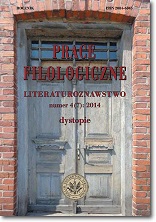Dystopia miejska w twórczości Czesława Miłosza
Urban dystopia in the works of Czesław Miłosz
Author(s): Tomasz JędrzejewskiSubject(s): Literary Texts
Published by: Wydział Polonistyki Uniwersytetu Warszawskiego
Keywords: dystopia; miasto; Miłosz; dystopia; city; Miłosz
Summary/Abstract: The article discusses the problem of urban dystopia in Czesław Miłosz’s works. In his many essays, memoirs as well as poems various cities are shown as the examples of {cité infernal}, land of Ulro or at least as an oppressive space in which traditional human relationship is disordered. Warsaw always seems to be an “unreal city” destroyed by the history. Miłosz describes the capital of Poland in the shadow of the World War II. The ruins of Warsaw in the 1940’s give the impression of a city that never existed. Modern Paris is portrayed as the capital of the World, but on the other hand, for Miłosz, it is an example of corrupted Western civilization, in which human life is always determined by the money and social status. The American cities are considered by Miłosz as temporary camps, not related neither to history, nor to nature. All these symptoms of urban dystopia are contrasted in Miłosz’s works with the myth of province (identified especially with Lithuania).
Journal: Prace Filologiczne. Literaturoznawstwo [PFLIT]
- Issue Year: 2014
- Issue No: 4 (7)
- Page Range: 291-304
- Page Count: 14
- Language: Polish

